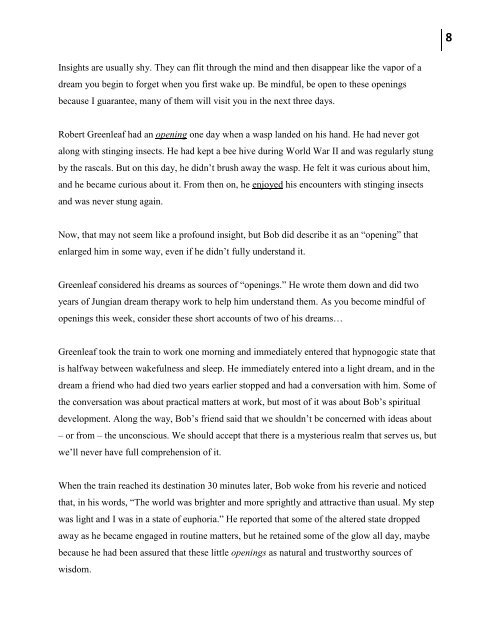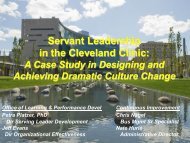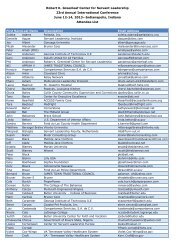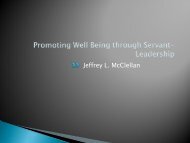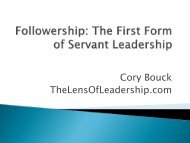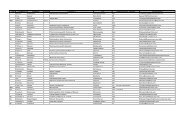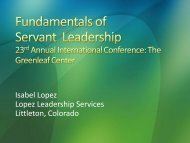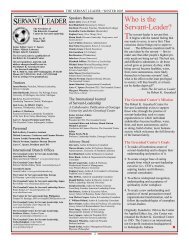Lessons You can Use from the Life of Robert K. Greenleaf
Lessons You can Use from the Life of Robert K. Greenleaf
Lessons You can Use from the Life of Robert K. Greenleaf
You also want an ePaper? Increase the reach of your titles
YUMPU automatically turns print PDFs into web optimized ePapers that Google loves.
8<br />
Insights are usually shy. They <strong>can</strong> flit through <strong>the</strong> mind and <strong>the</strong>n disappear like <strong>the</strong> vapor <strong>of</strong> a<br />
dream you begin to forget when you first wake up. Be mindful, be open to <strong>the</strong>se openings<br />
because I guarantee, many <strong>of</strong> <strong>the</strong>m will visit you in <strong>the</strong> next three days.<br />
<strong>Robert</strong> <strong>Greenleaf</strong> had an opening one day when a wasp landed on his hand. He had never got<br />
along with stinging insects. He had kept a bee hive during World War II and was regularly stung<br />
by <strong>the</strong> rascals. But on this day, he didn’t brush away <strong>the</strong> wasp. He felt it was curious about him,<br />
and he became curious about it. From <strong>the</strong>n on, he enjoyed his encounters with stinging insects<br />
and was never stung again.<br />
Now, that may not seem like a pr<strong>of</strong>ound insight, but Bob did describe it as an “opening” that<br />
enlarged him in some way, even if he didn’t fully understand it.<br />
<strong>Greenleaf</strong> considered his dreams as sources <strong>of</strong> “openings.” He wrote <strong>the</strong>m down and did two<br />
years <strong>of</strong> Jungian dream <strong>the</strong>rapy work to help him understand <strong>the</strong>m. As you become mindful <strong>of</strong><br />
openings this week, consider <strong>the</strong>se short accounts <strong>of</strong> two <strong>of</strong> his dreams…<br />
<strong>Greenleaf</strong> took <strong>the</strong> train to work one morning and immediately entered that hypnogogic state that<br />
is halfway between wakefulness and sleep. He immediately entered into a light dream, and in <strong>the</strong><br />
dream a friend who had died two years earlier stopped and had a conversation with him. Some <strong>of</strong><br />
<strong>the</strong> conversation was about practical matters at work, but most <strong>of</strong> it was about Bob’s spiritual<br />
development. Along <strong>the</strong> way, Bob’s friend said that we shouldn’t be concerned with ideas about<br />
– or <strong>from</strong> – <strong>the</strong> unconscious. We should accept that <strong>the</strong>re is a mysterious realm that serves us, but<br />
we’ll never have full comprehension <strong>of</strong> it.<br />
When <strong>the</strong> train reached its destination 30 minutes later, Bob woke <strong>from</strong> his reverie and noticed<br />
that, in his words, “The world was brighter and more sprightly and attractive than usual. My step<br />
was light and I was in a state <strong>of</strong> euphoria.” He reported that some <strong>of</strong> <strong>the</strong> altered state dropped<br />
away as he became engaged in routine matters, but he retained some <strong>of</strong> <strong>the</strong> glow all day, maybe<br />
because he had been assured that <strong>the</strong>se little openings as natural and trustworthy sources <strong>of</strong><br />
wisdom.


